We’ve probably all said or at least thought “if I knew then, what I know now, I would have done things differently.” We should have stayed in school longer. We should have listened to our parents. We should have bought Apple stock in 2002 for $8.50 that sells for $400 today. Or we could have bought gold in 2000 for under $300 for a four-fold profit today.
Years from now, if we look back at 2012, we may say that it was the best buyer’s market ever. Even now, in 2013, it’s apparent that both housing and mortgage prices are going up and they may never return to the record low levels.
The housing affordability index, which is considered to be good at 100, had increased to over 200 this past December, January and February. Shrinking inventories and rising prices in most markets have caused the index to fall to 172.7 for May 2013.
This market applies equally to acquiring a home to live in or a home to use as a rental. It is estimated that about 30% of the property purchased last year was done by investors. It is understandable because the positive cash flows far exceed most other investment alternatives.
Homeowners moving up in a rising market may sell their home for more by waiting but it will also cost them more for a new house. Typically, a person buys a 50% larger home when they move up. If they wait for prices to go up 10% on the $150,000 home they’re selling, they’ll realize $15,000 more but will pay $22,500 more for the new home purchase. They’ll actually net $7,500 less by waiting for prices to go up and may have to pay a higher mortgage rate too.
The question homebuyers and investors alike are faced with today is whether they will be saying years from now that they seized or missed an opportunity of a lifetime.

